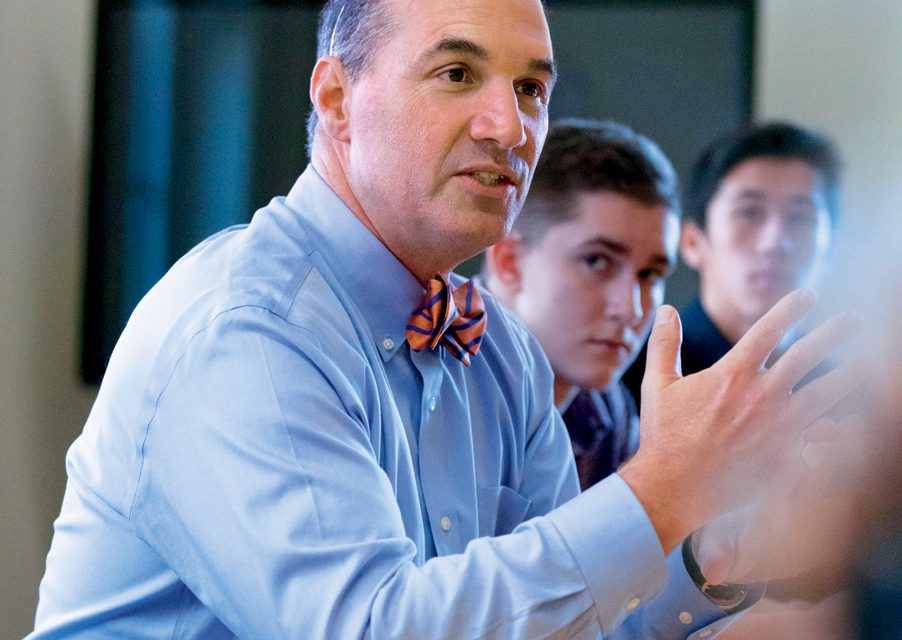
Paying It Forward

Few things are more inspiring than witnessing the moment a child opens the door to their own potential.
I stood in the back of the auditorium at Boston’s Henderson Inclusion School as musicians from Milton Academy’s chamber orchestra taught their hosts, the school’s kindergartners, about musical instruments: the sounds they make, their role in an orchestra, and the importance of practice.
Henderson is a Boston public school educating students from kindergarten through 12th grade across two campuses in Dorchester. Named after retired Boston educator William Henderson, who went blind during his career, the school educates students with physical and intellectual disabilities in general education classrooms alongside their nondisabled peers. Seeing our Upper School students as they shared the magic of music with their wide-eyed, inquisitive audience — in a warm, accepting environment where all students have the opportunity to thrive — I was reminded of a fundamental truth: We can’t know what a child is capable of unless they have exposure to what’s possible and access to the right tools.
Milton’s music department chair, Adrian Anantawan, lives that truth: Adrian has pioneered a relationship between Milton and Henderson, and Milton students have succeeded in raising thousands of dollars to provide ability-appropriate instruments for interested young musicians who may not otherwise have access. This program for music inclusion carries a strong message: Music is for everyone, regardless of physical ability or the money to pay for instruments and lessons.
Helping students unlock the doors to their own potential is why we, as educators, do what we do. A key component of a Milton education is fostering in each student the excitement to explore and develop their interests and passions, and encouraging them to help others do the same.
When we can expand access to those outside our own campus, we provide not only a critical public service, but an experience that shows our students and adults the countless ways they can make a difference in this world. We witness this as our students support their classmates and other young people, as faculty members collaborate with their peers at Milton and beyond, and as members of our community reach out to help neighbors struggling through challenging times.
Last year, during the 2018–2019 school year, two dedicated English faculty members, Alisa Braithwaite and Lisa Baker, launched the Humanities Workshop, a project-based learning program designed to show the role the humanities play in a well-functioning society. In the workshop’s first year, Alisa and Lisa assembled a consortium of five Boston-area private, public, and charter schools to tackle the topic of socioeconomic inequality in Boston. Through a variety of storytelling forms — from videos to poster displays — students in their English, modern language, arts, history, and social sciences classes explored a variety of issues around this topic. With their peers in the participating schools, Alisa and Lisa opened the door to collaborative learning across the city of Boston: more than 1,000 students worked on the project in its first year.
Our students are similarly engaged. Each week, more than 200 Upper School student volunteers fan out across Greater Boston through our Community Engagement Programs and Partnerships office. For them, service is more than just a résumé-builder: It is a key part of their own learning process, and a way to pay forward the opportunities they’ve had at Milton and elsewhere in their lives. Whether they’re helping Special Olympians develop as athletes and cheering them in competition, assisting at a summer camp in Navajo Nation, or caring for women and children in a transitional shelter, our students are sharing their hearts and minds with the world around them. This engagement gives them the opportunity to use their talents and kindness to lift up others, sometimes igniting the first sparks of interest for a career in service. It also gives students perspective into the social and economic challenges facing the people who surround us daily — sometimes within our own community.
Opening the door to every student’s potential is fundamental to what Milton offers our diverse, amazing students. In this issue, you will read about the important work we are doing on campus to help students realize their full potential and also about some of our alumni who are dedicated to providing greater opportunity for others.
Every year, I hear from parents and students about the profound impact of Milton on their lives. And every year, I am filled with overwhelming gratitude to be associated with an institution capable of providing opportunities to so many people, in so many different ways.




